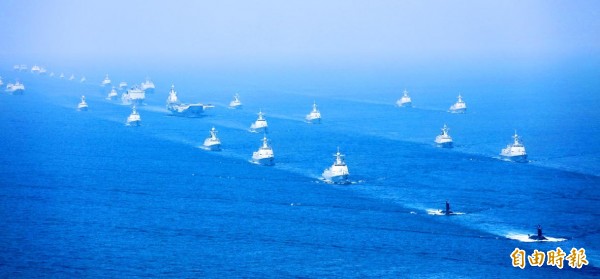《TAIPEI TIMES》 US admiral pans ‘intercept everything’ plan

In this April 12, 2018, file photograph released by China’s Xinhua news agency, the Liaoning aircraft carrier is accompanied by navy frigates and submarines conducting an exercises in the South China Sea. Photo: Xinhua via AP
By Aaron Tu and Jonathan Chin / Staff reporter, with staff writer
Taiwan and Japan should confront China’s aggressive maritime patrols by making simulated attacks against the Chinese People’s Liberation Army Navy (PLAN) aircraft carrier Liaoning, retired US Navy admiral Dennis Blair said on Wednesday last week.
Blair, who served as national intelligence director under former US president Barrack Obama, made the remarks in an article discussing China’s maritime and air activity published on the Sasakawa Peace Foundation’s Web site, an organization he chairs.
In the article, Blair said that Taiwan and Japan’s practice of scrambling their forces to intercept and escort each Chinese air and maritime patrol, which he termed “intercept everything,” is wasteful and counterproductive.
Such operations use up valuable flying time, strain limited budgets and achieve little in terms of military value, while creating a pattern of reactions that the PLA could exploit in war, he wrote.
Under the “intercept everything” policy, Taiwan and Japan are degrading the combat readiness of their forces to defend their territory and lowering their ability to deter Chinese military aggression, he added.
Taiwanese and Japanese forces should instead make their response selective, unpredictable and unrevealing of their full capabilities, while exercising their right under international law to occasionally patrol near Chinese territory and ignore Chinese protests, he wrote.
“Taiwanese forces should take advantage of [the PLAN carrier’s] presence to carry out simulated attacks against the Liaoning, raising their own readiness and demonstrating the reality that the Liaoning is vulnerable under wartime conditions,” he wrote, adding that Taiwanese and Japanese should understand that it is wartime capabilities, not peacetime operations, that deter potential aggressors from taking military action.
The two nations’ leaders should communicate to their respective citizens that ship and aircraft movement in peacetime do not reflect their ability under wartime conditions, he wrote.
The Liaoning — a refurbished Kuznetsov-class vessel and China’s sole aircraft carrier — has participated in 10 patrols and drills near Taiwan, four of which occurred this year, including a launch and recovery exercise in the Pacific.
When asked to comment, a Ministry of National Defense official said the military deems the shadowing of Chinese aircraft and ships by our forces a necessary policy for national security.
The military’s ground-based missile batteries, warships and fighters are well armed with Hsiung Feng and Harpoon anti-ship missiles, the source added.
新聞來源:TAIPEI TIMES

















